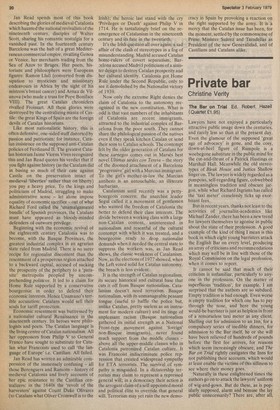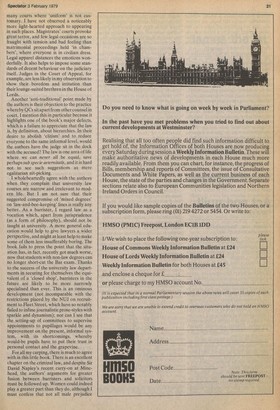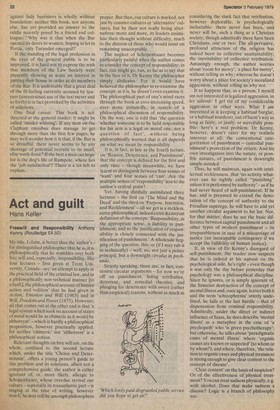Private bar
Christine Verity
The Bar on Trial Ed. Robert Hazell (Quartet £1.95) Lawyers have not enjoyed a particularly attractive public image down the centuries, and rarely less so than at the present day. Even the glamour of the supposed `great age of advocacy' is gone, and the cosy, down-at-heel figure of Rumpole is a woebegone substitute in the public mind for the cut-and-thrust of a Patrick Hastings or Marshall Hall. Meanwhile the old stereotypes of Bleak House and Justice Shallow linger on. The lawyer is widely regarded as a pompous, self-regarding figure, cobwebbed in meaningless tradition and obscure jargon, while what Richard Ingrams has called the `taxi meter' ceaselessly ticks up exorbitant fees.
But in recent years, thanks not least to the activities of journalist-academics like Michael Zander, there has been a new trend for lawyers themselves to agonise in public about the state of their profession. A good example of the kind of thing I mean is this book in which eight young barristers attack the English Bar on every level, producing an array of criticisms and recommendations which may well be in line with those of the Royal Commission on the legal profession, when it comes to report.
It cannot be said that much of their criticism is unfamiliar, particularly to anyone in the profession. On the matter of superfluous `tradition', for example, I am surprised that the authors are so subdued. Empty tradition is bad enough. Even worse is empty tradition for which one has to pay through the nose, and here the young would-be barrister is just as helpless in front of a remorseless taxi meter as any client. Shelling out for admission to an Inn, for a compulsory series of inedible dinners, for admission to the Bar itself, he or she will have been relieved of hundreds of pounds before the first fee arrives, for reasons which seem increasingly obscure, and The Bar on Trial rightly castigates the Inns for not publishing their accounts, which would at least enable the victims of this silliness to see where their money goes.
Naturally in these enlightened times the authors go on to attack the lawyers' uniform of wig-and-gown. But do these, as is popularly supposed, alarm and bemuse the lay public unnecessarily? There are, after all, many courts where 'uniform' is not customary. I have not observed a noticeably more light-hearted approach to appearing in such places. Magistrates' courts provoke great terror, and few legal occasions are so fraught with tension and bad feeling than matrimonial proceedings held 'in chambers', where everyone is in civilian dress. Legal apparel distances the emotions wonderfully. It also helps to impose some standards of decent behaviour on the judiciary itself. Judges in the Court of Appeal, for example, are less likely in my observation to show their boredom and irritation than their lounge-suited brethren in the House of Lords.
Another 'anti-traditional' point made by the authors is their objection to the practice whereby QCs sit apart from other counsel in court. I mention this in particular because it highlights one of the book's major defects, which is a failure to appreciate that the law is, by definition, about hierarchies. In their desire to abolish 'elitism' and to reduce everyone to the same informal level, would the authors have the judge sit in the dock with the accused? The law is one area of life where we can never all be equal, save perhaps sub specie aetemitatis, and it is hard not to see such suggestions as mere egalitarian nit-picking.
I wholeheartedly agree with the authors when they complain that university law courses are narrow and irrelevant to modern life. But I am not sure that their suggested compromise of 'mixed degrees' on `law-and-bee-keeping' lines is really any better. As a barrister, I regard law as a vocation which, apart from jurisprudence (as a form of philosophy), should not be taught at university. A more general education would help to give lawyers a wider perspective, and might at least help to make some of them less insufferably boring. The book fails to press the point that the situation has, in fact, recently got much worse, now that students with non-law degrees can no longer short-cut the Bar exam. Thanks to the success of the university law departments in securing for themselves the equivalent of a 'closed shop', barristers in the future are likely to be more narrowly specialised than ever. This is an ominous development (not incomparable with the restrictions placed by the NUJ on recruitment to Fleet Street, which have so notably failed to infuse journalistic prose-styles with sparkle and dynamism); nor can I see that the setting-up of committees to supervise appointments to pupillages would be any improvement on the present, informal system, with its shortcomings, whereby would-be pupils have to put their trust in personal contact and the grapevine.
For all my carping, there is much to agree with in this little book. There is an excellent chapter on the criminal law, and despite Sir David Napley's recent carry-on at Minehead, the authors' arguments for greater fusion between barristers and solicitors must be followed up. Women could indeed play a greater part than they do, although I must confess that not all male prejudice against lady barristers is wholly without foundation: neither this book, nor anyone else, has yet provided an answer to the riddle recently posed by a friend and colleague: 'Why was it that when the Bar opened its doors to women, hoping to let in Portia, only Turandot emerged?'
If the standing of the legal profession in the eyes of the general public is to be improved, it is hard not to express the wish that members of the Law Society were presently showing as acute an interest in putting their house in order as do members of the Bar. It is undeniable that a great deal of the ill-feeling currently aroused by lawyers (unrestrained use of the taxi meter and so forth) is in fact provoked by the activities of solicitors.
One final caveat. This book is not directed at the general reader: it might be called `insider whining'. If any man on the Clapham omnibus does manage to get through more than the first few pages, he may well wonder how it is that, if the Bar is so dreadful, there never seems to be any shortage of potential recruits to its small, elite work-force? If the best a man can hope for is the dog's life of Rumpole, where lies the 'job satisfaction'? There is a lot left to explain.




































 Previous page
Previous page